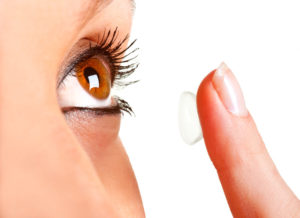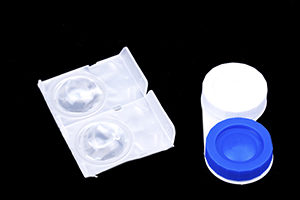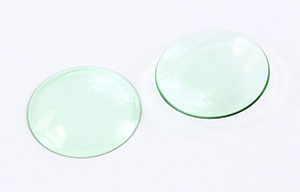 Today there are many different types of contact lenses to fit nearly every individual need and lifestyle. You can be confident that our trained and experienced eye care professionals will help you find the right lenses for you. We’ll provide you with detailed advice and fit you for your contact lenses right here in our store using the latest technology.
Today there are many different types of contact lenses to fit nearly every individual need and lifestyle. You can be confident that our trained and experienced eye care professionals will help you find the right lenses for you. We’ll provide you with detailed advice and fit you for your contact lenses right here in our store using the latest technology.
There are many different contact lens types available, all of which require a prescription from an eye care provider. Talk to one of our eye care professionals if you’re thinking about getting contact lenses or changing your contact lens type. To get a prescription for contact lenses, we will:
- Perform a complete examination of your eyes
- Try contact lenses on your eyes
- Determine how the contact lenses fit on your eyes
- Test your vision through the contact lenses
- Give you instructions on proper contact lens wear and care
We’d be happy to give you detailed advice in our shop. Call today to schedule an appointment at 718.236.6090
Our eye care professionals will help you get the best possible vision and comfort from contact lenses. Wearing contact lenses without a proper fitting and lens care instructions from an eye care provider can lead to eye injury, infection, or other complications. Contact lens types may differ based on what they are made from (lens material), how long they are designed for wearing each day (wear schedule), and how often they should be replaced (replacement schedule). The most common contact lens types include the following:
Lens Material: Soft or Hard (Rigid Gas Permeable)
Soft contact lenses are made of soft, flexible plastics that allow oxygen to pass through to the cornea—the clear dome that covers the colored part of the eye. This lens material may be easier to adjust to and provide better initial comfort than hard, or rigid gas permeable, contact lenses. Soft contact lenses are the most common lens material worn.

Hard, or rigid gas permeable (RGP), contact lenses are more durable than soft contact lenses and are resistant to buildup of eye-produced deposits on the lens surface. Hard contact lenses generally provide clearer, crisper vision. They also tend to be less expensive over the life of the lens since they last longer than soft contact lenses. Hard contact lenses are easier to handle and less likely to tear. However, they may take a longer period of time to adjust to as compared to soft contact lenses. They also require a more complex cleaning and disinfection process than soft contact lenses.
Wear Schedule: Daily Wear or Extended Wear
Daily wear contact lenses are intended for use during the day. They are not designed for overnight wear. Remove daily wear contact lenses each night, rub and rinse with contact lens solution, and place in a clean contact lens storage case filled with fresh contact lens solution to disinfect them. Sleeping in daily wear contact lenses can increase the chances of getting a serious eye infection.
Extended wear contact lenses are available for overnight wear ranging from one to six nights or up to 30 days. Extended wear contact lenses are usually made of soft plastics that allow more oxygen to pass through to the cornea. There are also a few brands of hard contact lenses designed and approved for overnight wear. Length of continuous wear depends on the contact lens type and your eye care provider’s evaluation of your tolerance for overnight wear. It’s important for the eyes to have a rest without lenses for at least one night following each scheduled removal 1. Talk with your eye care provider before considering this option, as overnight contact lens wear has been linked to serious eye infections.
Replacement Schedule (for soft contact lenses): Daily Disposable or Planned Replacement
Disposable contact lenses—as defined by the U.S. Food and Drug Administration (FDA)—are used once and then thrown away. With a true daily disposable schedule, a brand new pair of lenses is used each day. Wearing daily disposable contact lenses for more than one day may cause eye discomfort or other complications. Discard daily disposable contact lenses at the end of each day, and put in a new pair the next day.
Planned Replacement – Some soft contact lenses are labeled as “disposable,” but they may be removed nightly and re-worn for multiple days. Replacement schedules for these contact lenses can vary from seven to 30 days. Talk to your eye care provider about the proper schedule for replacing your specific type of contact lens. Follow these tips to clean, disinfect, and store your contact lenses each time you remove them. Replace your contact lenses as often as your eye care provider tells you. Wearing contact lenses longer than the recommended replacement schedule can lead to eye discomfort or other complications.
These lenses have a long life span and can be used over an extended period of time. First, you must be specially fitted for the right lenses for your eyes. Our eye care professionals will personally advise you in detail about the features of these lenses and how to care for them.
Check out our videos on the proper insertion and removal of contact lenses, and the video on the three steps to cleaning contact lenses.
Children & Contact Lenses
Children can safely and successfully wear contact lenses if they care for them properly. This often means having the support of a parent or other adult to help encourage healthy wear and care behaviors and reduce the risk of eye infections and other complications.
